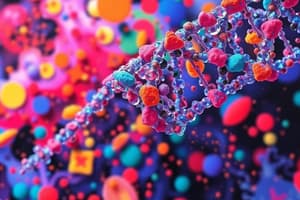Podcast
Questions and Answers
What is the primary function of the G₁ phase in the cell cycle?
What is the primary function of the G₁ phase in the cell cycle?
- Dividing the DNA into two sets
- DNA replication
- Final preparations for cell division
- Organelle production and growth (correct)
What type of stem cells can differentiate into any cell type required for the development of a complete organism?
What type of stem cells can differentiate into any cell type required for the development of a complete organism?
- Totipotent stem cells (correct)
- Unipotent stem cells
- Multipotent stem cells
- Pluripotent stem cells
What is the main function of the Xylem in vascular tissue?
What is the main function of the Xylem in vascular tissue?
- Carries water from roots to other parts (correct)
- Moves sugars made during photosynthesis
- Supports the plant and stores stuff
- Covers and protects the plant
What type of root system is characteristic of carrots and beets?
What type of root system is characteristic of carrots and beets?
During which phase of mitosis do sister chromatids separate?
During which phase of mitosis do sister chromatids separate?
What is the primary function of the Intercalary Meristems in plant growth?
What is the primary function of the Intercalary Meristems in plant growth?
What is the primary function of the chloroplasts in plant cells?
What is the primary function of the chloroplasts in plant cells?
What is the main difference between plant and animal cells in terms of their cell walls?
What is the main difference between plant and animal cells in terms of their cell walls?
What is the stage of the cell cycle where the cell prepares for division?
What is the stage of the cell cycle where the cell prepares for division?
What is the fundamental unit of structure and function in all living organisms?
What is the fundamental unit of structure and function in all living organisms?
What type of microscope uses electron beams to produce high-resolution images?
What type of microscope uses electron beams to produce high-resolution images?
What is the characteristic of plant cells that allows them to make their own food?
What is the characteristic of plant cells that allows them to make their own food?
Flashcards are hidden until you start studying
Study Notes
Cell Cycle
- Cell grows, duplicates its DNA, and gets ready for division
- G₁ phase: Growth and organelle production
- S phase: DNA replication
- G₂ phase: Final preparations
- Mitotic (M) phase: The actual division process
- Mitosis: Dividing the DNA into two sets
- Prophase: Chromosomes condense
- Metaphase: Chromosomes line up
- Anaphase: Sister chromatids separate
- Telophase: New nuclear envelopes form
- Cytokinesis: Splitting the cell into two daughter cells
- G₀ phase: Some cells rest and don’t divide
Types of Stem Cells
- Totipotent stem cells: Can differentiate into any cell type required for the development of a complete organism
- Pluripotent stem cells: Can differentiate into all of the cells of the adult body
- Multipotent stem cells: Can differentiate into a limited range of cell types
- Oligopotent stem cells: Can differentiate into a few closely related cell types
- Unipotent stem cells: Can only differentiate into one cell type
Plant Organ Systems
- Meristematic Tissue: Cells that keep dividing and help the plant grow
- Apical Meristems: At the tips of stems and roots, they make the plant longer
- Lateral Meristems: Make the plant thicker as it grows
- Intercalary Meristems: Found in some plants, they allow for elongation even after cutting
- Permanent Tissue: Cells have specific jobs and don’t divide anymore
- Dermal Tissue: Covers and protects the plant
- Vascular Tissue: Moves water, nutrients, and sugars around
- Ground Tissue: Supports the plant, stores stuff, and helps with photosynthesis
- Shoot System: Aboveground parts like stems, leaves, flowers, and fruits
- Root System: Underground, supporting the plant
Types of Roots
- Tap Root System: Main Root grows straight down, anchors the plant, and stores nutrients
- Fibrous Root System: Many roots, provides stability and absorbs water
- Adventitious Root System: Unusual roots, develops from stems or leaves, supports, breathes, and stores food
Types of Microscopes
- Simple Microscope: Single lens magnification
- Compound Microscope: Multiple lenses system
- Electron Microscope: Uses electron beams for high-resolution images
- Fluorescence Microscope: Uses fluorescence or phosphorescence to study properties
- Digital Microscope: Displays image digitally, often connected to a computer
Cell Theory
- All known living things are made up of one or more cells
- All living cells arise from pre-existing cells by division
- The cell is the fundamental unit of structure and function in all living organisms
- The activity of an organism depends on the total activity of independent cells
- Energy flow (metabolism and biochemistry) occurs within cells
- Cells contain DNA which is found specifically in the chromosome and RNA
- All cells are basically the same in chemical composition in organisms of similar species
Organelles Function & Structure Plant vs. Animal Cell
- Plant cells are rigid and autotrophic, while animal cells are flexible and heterotrophic
- Plant cells have a cell wall, which provides structure and support, while animal cells do not
- Plant cells contain chloroplasts, which are responsible for photosynthesis, while animal cells do not
- Plant cells have a larger central vacuole, which stores nutrients and waste, while animal cells have smaller, more numerous vacuoles
Studying That Suits You
Use AI to generate personalized quizzes and flashcards to suit your learning preferences.




